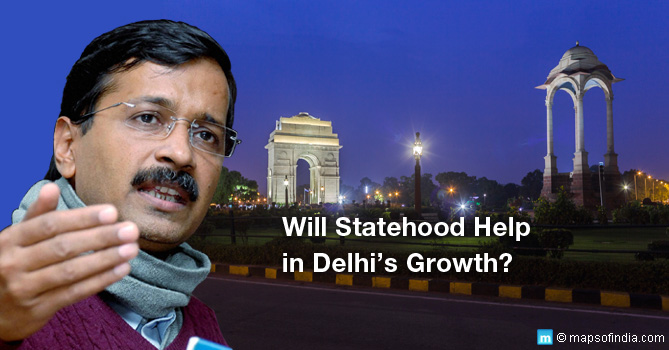Since Delhi has been granted the status of a state, the demand for extending the current status to ‘full statehood’ has been voiced repeatedly by the Congress, BJP, and now the newly formed Aam Aadmi Party.
So how is the current status of Delhi any different from any other state in India?
While other states enjoy full authority in all matters of government and administration, the Delhi government has no jurisdiction on:
• Police
• Public law and order
• Land
Other than these crucial functions, there are several other civil arms of government that are under the central control and the Delhi government has little say in crucial matters pertaining to them. Therefore, it is a fair claim that Delhi government does not enjoy the same powers as those of other states and therefore the demand for ‘full statehood’ seems to be a credible one.
But the status of ‘full statehood has its implications, pros and cons, which need to be well thought over by all stakeholders before deciding whether ‘full statehood’ is the best option for Delhi. Let’s take a fair view of the debate that has been raging between the centre and those calling for ‘full statehood’.
Control of Delhi Police
The argument forwarded by the centre justifying the need to hold control over the Delhi Police is that Delhi is the capital of the country and therefore security of all central institutions, including Parliament, President & Prime Minister’s residences, various central ministries, headquarters of the three armed forces, along with various embassies and international bodies, cannot be handed over to the state government. There is merit in this argument as experience in several states have shown how the local police is often used to pursue the ruling party’s agenda at the cost of fair and transparent policing. The implications of these can be serious in the case of Delhi.
Public Law and Order
As an extension to the above, maintaining public law and order in the capital is vital to the overall stability of the country and any threat of an emerging situation must be dealt with immediately and without political bias. Given the cosmopolitan mix of Delhi, which has people from all parts of the country living here, the occasional conflict which emerges from religious, cultural, social, political or economic differences, requires a police force that is free from prejudice or bias based on any of the mentioned factors. Therefore, the city requires a neutral force that is acceptable to all residents of Delhi, domestic or international.
The big question is, can the Delhi government, irrespective of which party is in power, guarantee that? The counter argument could be, is the present police force in Delhi, which is under central control, meeting those standards?
A fair assessment would be that there is indeed a case for a special police force and controlled by the centre, to protect central institutions, while the regular Delhi Police be brought under the jurisdiction of the local state government. This will give the state government the freedom to prioritise policing as per local needs, while bringing in greater accountability from the ruling party on general law and order.
The recent killing of a teen girl in West Delhi has taken a political turn with AAP blaming Delhi Police and by extension, the centre, for the increase in overall crime in Delhi. To avoid situations like these, it will be better if the local administration exercises full control over Delhi police so that responsibility and accountability for law and order remains with the state government. The special police can take responsibility for most of Lutyens Delhi and areas coming under NDMC and the Cantonment Board, while law and order for rest of Delhi could remain with Delhi Police.
There are existing examples of this dual policing model in several international capitals including Washington D.C. (USA), Ottawa (Canada), and also the Vatican in Rome, Italy where the Vatican has its own Police and Rome has its own.
Land: ownership, allocation and taxes
There is no justification for the centre to continue its jurisdiction over land and all matters related to it. Today, the city faces a multitude of problems with lack of housing being one of the most critical one. The population of Delhi has increased significantly over the last four decades and is continuing to grow with increasing migration of people from all parts of India seeking employment in Delhi.
The worst hit are the economically weaker sections who are forced to live in shanties in slums that are located in all parts of Delhi. These are people bereft of access to basic civic amenities and to make matters worse, they have to deal with the menace of extortion from local mafia and the police, who constantly harass them. This is the largest segment that voted for AAP in the recent elections and also places maximum hope on the party to support them in getting access to permanent housing and civic amenities.
So how can AAP, or for that matter, any ruling party, face the electorate after committing to improve their lives, when they do not hold any jurisdiction over matters pertaining to land ownership, allocation or taxes?
The city has large tracts of land that have been illegally occupied over the years by migrant labour from other states. The political powers continued to look the other way, as these were valuable vote banks, while in many cases government land was taken over to build shanties. These unauthorised colonies came up without any sewerage or waste management provisions, no proper road access, no sanctioned electricity connections, no piped water access etc. Since these are unauthorised colonies, the Delhi government has been unable to realise taxes from land ownership or land transactions, thereby denying the state of crucial revenues it desperately needs.
Under the present rules, the Delhi State Assembly can pass an Amendment but the same requires the approval of the Lieutenant Governor, the Ministry of Urban Development and finally the Ministry of Home Affairs before the amendment becomes law. Therefore, there is a strong case for all matters pertaining to land to rest with the Delhi government and not the centre.
Implications of granting ‘full statehood’ to Delhi
Converting the present status of Delhi into ‘full statehood’ has several implications, mostly relating to finance and quality of governance. Delhi being a capital city enjoys the highest subsidy from the centre over any other state. Most of the infrastructure development that we see in Delhi today has been financed by the centre to a large extent. Delhi government is able to raise only a part of its annual budget each year through its existing sources with the centre funding most of the deficit. Were Delhi to become a state on par with other states, it will have to raise additional revenues to fund its various arms of government that are currently funded by the centre and this is going to directly impact the common man that voted the ruling party in.
Take for example, the demand to bring Delhi Police under the state government.
How will the Delhi government financially support the Delhi Police when it cannot independently meet its existing finance requirements? What about additional expenditure with regard to police modernisation, equipment, training and pensions? How does the present ruling party, AAP, plan to support these?
While all political parties have been vociferous in demanding that Delhi Police be brought under the state government jurisdiction, no definitive plans on funding the same have been offered. While there may be a case for Delhi Police to come under state government control, there are serious issues that need to be addressed, including demarcation of authority between areas in Delhi that will remain under central control and those under the state government.
Then there are other critical areas that need to be addressed. The city has been victim to apathy from respective municipal authorities who are perpetually fighting each other over jurisdiction and control, while shunning responsibility when there is a problem. The annual flooding during monsoons in many parts is a good example. All departments tend to shift blame since there is no clear demarcation of authority and control between the centre and state. Here again, the control for all development in Delhi must lie with the state government. But the question of sources for additional funding remains open.
To raise additional revenues the Delhi government will be forced to raise taxes across products and services in the state, while simultaneously lowering subsidies. The AAP government rode to power on the back of its promise to lower tariffs of electricity and water. Presently, the state government depends on other states for supply of both, while enjoying central subsidies on fuel. Once full statehood is granted, all central subsidies enjoyed thus far will go, leaving the local government to raise funds through increase in taxes just to meet existing expenditure, leave alone financing future projects etc. This is likely to hurt the common man most as inflation will rise.
Lastly, the important question of quality of governance is very important, as Delhi is also home to the diplomatic community, along with a host of other international agencies. The city expects a certain level of governance, which is commensurate with India’s emerging status as a modern and developed country.
The repeated squabbling between various arms of the government in Delhi has left a lot to be desired. While the same may be equally true of many other states as well, Delhi just cannot afford shoddy governance. AAP is yet to establish its credentials as a stable and mature government but then one year is too early to judge.
The question of full statehood to Delhi goes beyond political parties and must be seen in national interest. While the debate on granting full statehood to Delhi remains very much open, its residents continue to wait for a better life.
Read More:
Government–Naga Peace Accord
Bilateral Issues India Needs to Resolve
India–Bangladesh Enclaves
Nuclear Liability Law: What’s the Big Deal?
Land Acquisition Laws in India and the Duplicitous Deals
How Can India Benefit From Becoming a Member of SCO?
India’s strategic ties with Vietnam on the rise
India’s Foreign Policy Roadmap
Why Modi government is important for China, US






